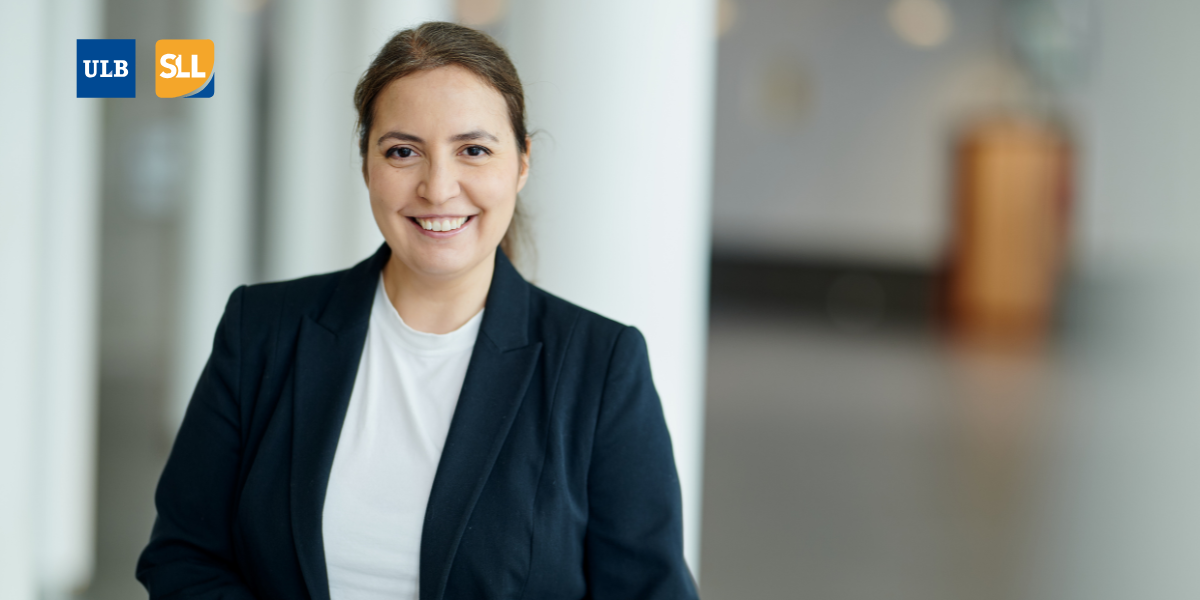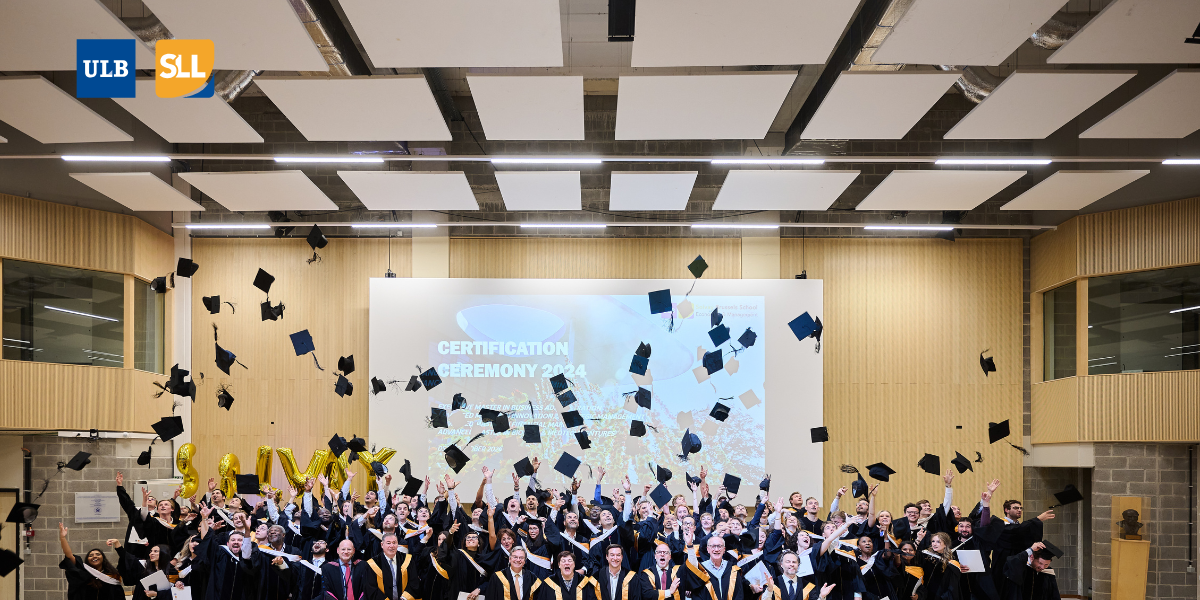Apprenez-en davantage sur Solvay Lifelong Learning.
Location
Duration
Frequency
Language
Tuition
Application deadline
Programme start:
Principale école de commerce belge
%20(600%20x%2079%20px)%20(2)-1.png?width=385&height=79&name=Logo%20EMBA%20Solvay%20(FT%20+%20QS)%20(600%20x%2079%20px)%20(2)-1.png)
- Aperçu 0
- Profil 0
- Avantages 0
- Programme d'études 0
- Inscription 0
- Contact 0
Qui est concerné par le programme ?
A qui s'adresse le programme ?
Profil
Cette certification, une spécialisation de notre Executive MBA phare, est conçue pour les professionnels expérimentés, les managers et les entrepreneurs en herbe qui sont prêts à devenir des champions de l'innovation au sein de leur organisation ou à lancer de nouvelles entreprises. Elle est idéale pour ceux qui souhaitent renforcer leur esprit d'entreprise, concevoir des solutions centrées sur le client, naviguer dans l'incertitude et créer un impact économique et sociétal dans un monde de plus en plus complexe.
Principaux critères d'admission
- Diplôme de l'enseignement supérieur (Bachelor/Master/Autre)
- Au moins cinq ans d'expérience professionnelle pertinente, idéalement avec des responsabilités en matière de développement commercial, d'innovation de produits ou de services, de gestion de projets ou d'initiatives entrepreneuriales.
- Maîtrise de l'anglais
- Forte motivation pour développer un esprit d'entreprise, maîtriser les outils d'innovation et transformer les idées en solutions évolutives qui répondent aux défis du monde réel.
Concevoir, tester et affiner en toute confiance des solutions innovantes qui répondent aux besoins complexes du marché, afin d'accélérer la mise sur le marché.
S'imposer comme un leader avant-gardiste capable de conduire l'innovation stratégique et les initiatives entrepreneuriales dans n'importe quel contexte organisationnel.
Développer l'état d'esprit et le savoir-faire pratique pour naviguer dans l'incertitude, faire pivoter efficacement les idées et transformer les visions audacieuses en résultats réalisables et durables.
Devenez un catalyseur d'idées transformatrices en préconisant des pratiques agiles et en créant un environnement propice à la créativité et à l'expérimentation.
Appliquer la pensée entrepreneuriale pour s'attaquer à des questions urgentes telles que la durabilité, l'inclusion et la transformation numérique, en créant une valeur partagée pour les entreprises et la société.
Développez vos relations par le biais de projets pratiques, d'ateliers dirigés par des experts et de l'apprentissage par les pairs, ouvrant ainsi la voie à de futurs partenariats et projets.
Vue d'ensemble et modules
Le certificat universitaire en innovation et entrepreneuriat permet aux professionnels de transformer leurs idées en entreprises évolutives et efficaces. Avec cinq modules de base répartis sur de longs week-ends ainsi qu'un voyage d'étude à l'étranger, les participantsacquièrent des connaissances pratiques et exploitables en matière de développement de nouveaux produits, d'innovation de modèles d'entreprise, de finance entrepreneuriale et de politique - le tout aboutissant à un projet de fin d'études qui transforme la théorie en une solution prête à être mise sur le marché. Guidés par des professeurs de premier plan et des experts de l'industrie, vous débloquerez votre capacité à créer, à diriger et à fournir des innovations révolutionnaires.
Entrepreneuriat, innovation et défis sociétaux
Aborder des questions sociétales urgentes par le biais de la pensée entrepreneuriale et de l'innovation, en se concentrant sur la création de solutions évolutives et percutantes pour relever les défis mondiaux.
Ce cours est préparatoire et doit être suivi par le participant en ligne pendant l'été.
- Fourni par Alexander HAHN
Développement de nouveaux produits
Apprendre à concevoir, développer et lancer avec succès de nouveaux produits en appliquant des approches centrées sur l'utilisateur, le prototypage agile et des techniques de validation du marché qui réduisent les risques et accélèrent les cycles d'innovation.
- Enseigné par Frederic OOM
Politique d'innovation
Comprendre comment les politiques et les cadres réglementaires influencent les écosystèmes d'innovation, et apprendre à naviguer, à façonner et à tirer parti des incitations publiques et privées pour favoriser la croissance durable et la compétitivité.
- Enseigné par John METSELAAR
Innovation du modèle d'entreprise
Explorer comment réinventer et adapter les modèles d'entreprise en réponse à l'évolution des marchés et des technologies, permettant aux organisations de capturer une nouvelle valeur et de maintenir un avantage concurrentiel.
- Enseigné par Benjamin BEECKMANS & Bruno WATTENBERGH
Finance entrepreneuriale et capital-risque
Maîtriser les outils financiers et les stratégies de financement dont les entrepreneurs ont besoin pour obtenir des capitaux, gérer la croissance et développer des entreprises, tout en examinant comment les entreprises s'appuient sur le venturing pour stimuler l'innovation interne.
- Enseigné par Olivier WITMEUR & Bruno WATTENBERGH
Innovation & Entrepreneurship Capstone
Le Capstone Innovation & Entrepreneurship vous prépare à transformer des idées en opportunités commerciales viables. Vous testerez des hypothèses, intégrerez les défis numériques et ESG et développerez des présentations basées sur des données, en acquérant une compréhension approfondie du parcours entrepreneurial de A à Z.
Voyage d'étude à Munich
Notre voyage d'étude à Munich est un voyage immersif et interactif d'une semaine à travers le réseau entrepreneurial de la ville, l'un des principaux moteurs de l'écosystème entrepreneurial européen. C'est l'occasion de s'inspirer de différents modèles d'entreprise et d'élargir votre compréhension internationale.

- Analyser les défis sociétaux et commerciaux complexes pour découvrir les besoins non satisfaits et les opportunités entrepreneuriales.
- Appliquer les cadres du Design Thinking et du Lean Startup pour concevoir et faire évoluer des solutions centrées sur le client.
- Faire preuve de résilience et d'adaptabilité pour naviguer dans l'ambiguïté et les risques inhérents à l'entrepreneuriat.

- Concevoir et valider des produits ou des services innovants en utilisant le prototypage et le cycle "construire-mesurer-apprendre".
- Élaborer des modèles d'entreprise robustes et adaptables qui répondent à l'évolution de la dynamique du marché.
- Intégrer le développement durable et les tendances numériques dans les stratégies d'innovation.

- Évaluer et sélectionner les stratégies de financement appropriées, y compris la finance entrepreneuriale et le corporate venturing.
- S'engager efficacement auprès de diverses parties prenantes en racontant des histoires convaincantes et en présentant des exposés fondés sur des données.
- Faire preuve de leadership et de travail d'équipe dans l'exécution de projets d'innovation, de l'idée au lancement sur le marché.
Les piliers de l'apprentissage
Votre retour sur investissement est la capacité de sortir équipé pour mener des programmes d'innovation, construire des entreprises durables et débloquer de nouvelles opportunités de croissance. Vous identifierez et validerez en toute confiance des idées commerciales prometteuses, développerez et testerez de nouveaux produits et modèles commerciaux tout en minimisant les risques, obtiendrez les ressources et le financement nécessaires pour mettre vos solutions à l'échelle, et dirigerez efficacement des équipes interfonctionnelles dans l'incertitude et le changement.
Chaque module dure quatre semaines, dont un long week-end intensif. Un mélange dynamique de conférences interactives en ligne et sur le campus, de discussions de cas et d'exercices collaboratifs invite les participants à s'attaquer à des problèmes du monde réel, à tester de nouvelles idées et à renforcer leur créativité et leur esprit critique. Tout au long du programme, un ensemble d'outils et de ressources de gestion pratiques - y compris des livres électroniques, des cas, des articles et des références en ligne - soutient l'application immédiate et sert de boîte à outils durable pour les décisions commerciales futures.
Classe inversée
Le contenu fondamental - tel que les lectures, les vidéos et les conférences d'experts - est exploré avant le cours. Cela signifie que le temps passé en classe est consacré à des discussions à fort impact, à des applications dans le monde réel et à la résolution de problèmes en collaboration. Résultat : une participation plus active et un apprentissage plus approfondi à chaque séance.
Apprentissage mixte
Chaque cours combine des activités en ligne flexibles avec des sessions dynamiques en personne. Ce format hybride prend en compte différents styles d'apprentissage, encourage la préparation à son propre rythme et garantit que le temps précieux passé en classe se concentre sur une interaction significative et une application pratique.
Apprentissage actif
Les participants sont au cœur du parcours d'apprentissage. Grâce à des discussions animées, des simulations, des débats et l'apprentissage par les pairs, la participation active devient une seconde nature. Cette approche renforce la pensée critique, approfondit la compréhension et permet d'acquérir des connaissances durables.
Évaluation authentique
Les évaluations reflètent les défis rencontrés dans les environnements professionnels réels. Qu'il s'agisse de développer un plan stratégique, de naviguer dans une simulation, de réfléchir à sa pratique personnelle du leadership ou de faire une présentation convaincante, chaque tâche est conçue pour tester l'application pratique, et pas seulement les connaissances.
30
%
les entreprises dotées d'une forte capacité d'innovation, qui font également preuve d'une plus grande résilience sur des marchés volatils, réalisent uneplus forte croissance de leur chiffre d'affaires
(Source : Étude EY sur l'innovation et la croissance, 2024)
70
%
des entreprises prévoient d'augmenter leurs investissements dans le développement de nouveaux produits et l'innovation des modèles d'entreprise au cours des trois prochaines années, ce qui crée une demande pour des professionnels capables de mener ces initiatives.
(Source : Deloitte Global Innovation Survey, 2023)
85
%
des dirigeants affirment que l'innovation est essentielleà leur stratégie de croissance, mais seulement 25 % d'entre eux estiment que leurs efforts actuels en matière d'innovation sont efficaces. Cette lacune met en évidence le besoin urgent de dirigeants compétents en matière de pensée entrepreneuriale.
(Source : PwC Innovation Benchmark Report, 2024)

Quels sont les critères d'admission ?
Pour participer au programme, les participants doivent être titulaires d'un diplôme universitaire et maîtriser l'anglais. Les candidats sont sélectionnés sur la base de leur dossier de candidature et d'un entretien.
Aide financière
RÉDUCTION
- Les anciens élèves de la Solvay Brussels School, de la Solvay Lifelong Learning, de l'Université libre de Bruxelles et de la Vrije Universiteit Brussel bénéficient d'une réduction de 10 % sur les frais de scolarité.
- Décision : Vos frais de scolarité peuvent être reconnus par les autorités belges comme des frais professionnels et peuvent donc donner droit à une déduction au titre de l'impôt des personnes physiques (IPP) et de l'impôt des sociétés (ISOC). Cette économie d'impôt potentielle pourrait couvrir jusqu'à 25 % de vos frais de scolarité. Pour plus d'informations, veuillez nous contacter ou visiter le site web du SPF.
SUBVENTIONS ET AIDES FINANCIÈRES
Sous réserve du renouvellement des accords régionaux
- Région bruxelloise - Subvention à la formation :les travailleurs indépendants ou les employés travaillant pour des PME à Bruxelles peuvent, sous certaines conditions, bénéficier d'une subvention à la formation.La demande de subvention doit être introduite dans les 30 jours suivant le début du programme, du module ou du cours ( pour plus d'informations :Economie-Emploi).
- Région bruxelloise - Congé de formation rémunéré : Le congé de formation rémunéré permet aux travailleurs (secteur privé) de se former pendant la journée ou en horaires décalés tout en conservant leur salaire. Les employeurs reçoivent un remboursement de Bruxelles Economie et Emploi, sur base de critères spécifiques.Le travailleur doit remettre l'attestation d'inscription (une attestation spécifique pour le congé-éducation délivrée par l'école) à son employeur dans les 20 jours précédant la date de début de la formation. Cette attestation doit être remise à l'employeur soit par courrier recommandé, soit avec accusé de réception. En cas d'inscription tardive après le lancement du programme, au plus tard dans les 8 jours suivant l'inscription. (pour plus d'informations :Economie-Emploi).
- Région flamande - Portefeuille PME : Le Portefeuille PME est destiné aux praticiens des professions libérales et aux PME dont le siège opérationnel est situé en Région flamande.La demande de subvention doit être introduite dans les 14 jours suivant la date de début du programme/module/cours ( pour plus d'informations :VLAIO).
- Région wallonne - Chèques formation :Employés à temps plein ou à temps partiel de PME comptant au maximum 250 travailleurs, ainsi que les indépendants.La demande de subvention doit être introduite dans les 14 jours suivant la date de début du programme/module/cours ( pour plus d'informations :Forem).
Salle de presse
Lire dans notre blog

Marianna is the Content & Social Media Coordinator at Solvay Brussels School - Lifelong Learning.
8/04/25
Our Editorial Team brings you the latest in blog posts covering business, finance, sustainability, and programme insights from Solvay Lifelong Learning!
31/07/25

Bruno is Senior Advisor and Ambassador for Innovation at EY and the Academic Director of the Solvay EMBA and Accelerated Management Programme. He is an expert in strategy, Entrepreneurship and Innovation.
9/04/25


